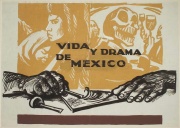Difference between revisions of "Blueprint paper"
(username removed) |
|||
| (6 intermediate revisions by 5 users not shown) | |||
| Line 1: | Line 1: | ||
| − | [[File:2002.14-SC28480.jpg|thumb|]] | + | [[File:2002.14-SC28480.jpg|thumb|Watercolor on blueprint<br>MFA 2002.14]] |
== Description == | == Description == | ||
| − | A photographic reproduction paper that, when developed, appears blue with white lines. The cyanotype method was suggested in 1842 by British astronomer Sir John Herschel but not widely used until the 1880s after Henri Pellet developed a direct positive blueprint process (1877). Blueprint paper begins as a smooth, white sheet of paper that is coated with light-sensitive chemicals (ammonium ferric citrate and [ | + | A photographic reproduction paper that, when developed, appears blue with white lines. The [[cyanotype]] method was suggested in 1842 by British astronomer Sir John Herschel but not widely used until the 1880s after Henri Pellet developed a direct positive blueprint process (1877). Blueprint paper begins as a smooth, white sheet of paper that is coated with light-sensitive chemicals (ammonium ferric citrate and [[potassium%20ferricyanide|potassium ferricyanide]]). The blueprint paper is then placed under a translucent sheet containing a black ink drawing, exposed to light then developed in a wash bath. The areas exposed to light turn blue while the areas blocked from light remain white, thus producing a drawing of white lines on blue paper. Blueprint paper was used for reproducing maps, architectural diagrams, and mechanical drawings before over-sized photocopy machines became widely available. |
== Synonyms and Related Terms == | == Synonyms and Related Terms == | ||
| − | cyanotype; blauwdruk (Ned.); bleu (Fr.); ozalid (Fr.); Blaupause (Deut.); cianografia (It.); cianotipo (Esp.); copia | + | cyanotype; blauwdruk (Ned.); bleu (Fr.); ozalid (Fr.); Blaupause (Deut.); cianografia (It.); cianotipo (Esp.); copia cianográfia (Esp.); blåtryck (Sven.); blåkopia (Sven.) |
| − | == | + | ==Resources and Citations== |
| − | * | + | * Boise Cascade Paper Group, ''The Paper Handbook'', Boise Cascade, Portland OR, 1989 |
| − | * | + | * Matt Roberts, Don Etherington, ''Bookbinding and the Conservation of Books: a Dictionary of Descriptive Terminology'', U.S. Government Printing Office, Washington DC, 1982 |
* ''The Dictionary of Paper'', American Paper Institute, New York, Fourth Edition, 1980 | * ''The Dictionary of Paper'', American Paper Institute, New York, Fourth Edition, 1980 | ||
| − | * | + | * E.J.LaBarre, ''Dictionary and Encyclopedia of Paper and Paper-making'', Swets & Zeitlinger, Amsterdam, 1969 |
| − | * | + | * Luis Nadeau, ''Encyclopedia of Printing, Photographic, and Photomechanical Processes'', Atelier, New Brunswick, 1997 |
* ''Dictionary of Building Preservation'', Ward Bucher, ed., John Wiley & Sons, Inc., New York City, 1996 | * ''Dictionary of Building Preservation'', Ward Bucher, ed., John Wiley & Sons, Inc., New York City, 1996 | ||
| − | * | + | * Richard S. Lewis, ''Hawley's Condensed Chemical Dictionary'', Van Nostrand Reinhold, New York, 10th ed., 1993 |
| − | * | + | * Random House, ''Webster's Encyclopedic Unabridged Dictionary of the English Language'', Grammercy Book, New York, 1997 |
* ''The American Heritage Dictionary'' or ''Encarta'', via Microsoft Bookshelf 98, Microsoft Corp., 1998 | * ''The American Heritage Dictionary'' or ''Encarta'', via Microsoft Bookshelf 98, Microsoft Corp., 1998 | ||
| − | * | + | * Multilingual Glossary for Art Librarians at http://www.ifla.org/VII/s30/pub/mgl.htm |
[[Category:Materials database]] | [[Category:Materials database]] | ||
Latest revision as of 15:37, 9 May 2022
Description
A photographic reproduction paper that, when developed, appears blue with white lines. The Cyanotype method was suggested in 1842 by British astronomer Sir John Herschel but not widely used until the 1880s after Henri Pellet developed a direct positive blueprint process (1877). Blueprint paper begins as a smooth, white sheet of paper that is coated with light-sensitive chemicals (ammonium ferric citrate and Potassium ferricyanide). The blueprint paper is then placed under a translucent sheet containing a black ink drawing, exposed to light then developed in a wash bath. The areas exposed to light turn blue while the areas blocked from light remain white, thus producing a drawing of white lines on blue paper. Blueprint paper was used for reproducing maps, architectural diagrams, and mechanical drawings before over-sized photocopy machines became widely available.
Synonyms and Related Terms
cyanotype; blauwdruk (Ned.); bleu (Fr.); ozalid (Fr.); Blaupause (Deut.); cianografia (It.); cianotipo (Esp.); copia cianográfia (Esp.); blåtryck (Sven.); blåkopia (Sven.)
Resources and Citations
- Boise Cascade Paper Group, The Paper Handbook, Boise Cascade, Portland OR, 1989
- Matt Roberts, Don Etherington, Bookbinding and the Conservation of Books: a Dictionary of Descriptive Terminology, U.S. Government Printing Office, Washington DC, 1982
- The Dictionary of Paper, American Paper Institute, New York, Fourth Edition, 1980
- E.J.LaBarre, Dictionary and Encyclopedia of Paper and Paper-making, Swets & Zeitlinger, Amsterdam, 1969
- Luis Nadeau, Encyclopedia of Printing, Photographic, and Photomechanical Processes, Atelier, New Brunswick, 1997
- Dictionary of Building Preservation, Ward Bucher, ed., John Wiley & Sons, Inc., New York City, 1996
- Richard S. Lewis, Hawley's Condensed Chemical Dictionary, Van Nostrand Reinhold, New York, 10th ed., 1993
- Random House, Webster's Encyclopedic Unabridged Dictionary of the English Language, Grammercy Book, New York, 1997
- The American Heritage Dictionary or Encarta, via Microsoft Bookshelf 98, Microsoft Corp., 1998
- Multilingual Glossary for Art Librarians at http://www.ifla.org/VII/s30/pub/mgl.htm
